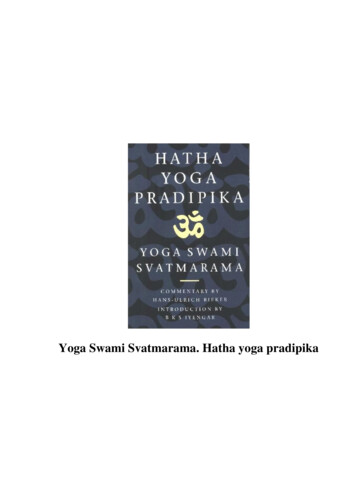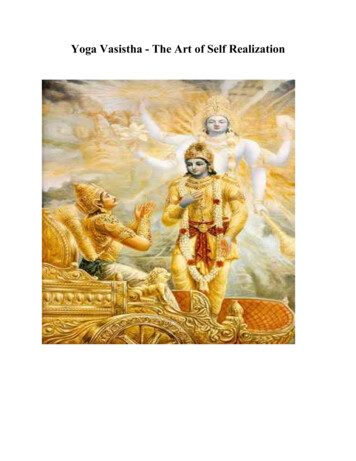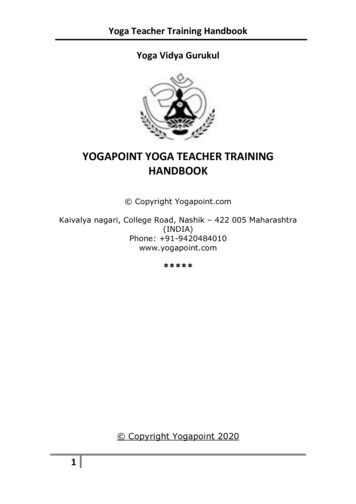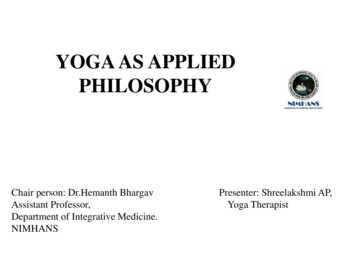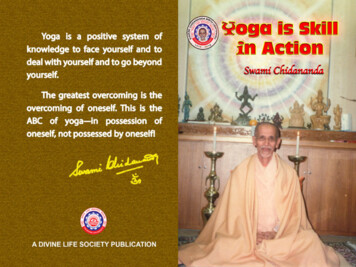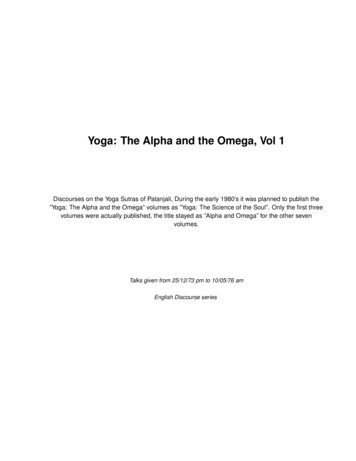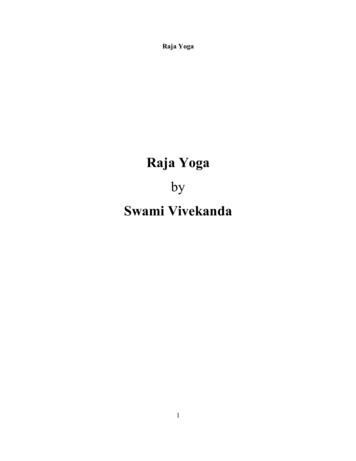
Transcription
Raja YogaRaja YogabySwami Vivekanda1
Raja Yoga2
Raja YogaTable of ContentsPrefix.4Preface.6Introductory.10The First Steps. 20Prana. 28The Psychic Prana.39References. 43The Control Of The Psychic Prana. 44Pratyahara And Dharana. 48Dhyana And Samadhi. 54Raja-Yoga In Brief.62Patanjali's Yoga Aphorisms. 67Introduction. 67Concentration: Its Spiritual Uses. 71References. 97Concentration: Its Practice. 98Powers. 124References. 136Independence.138References. 149Appendix - References To Yoga.151Shvetashvatara Upanishad - Chapter II.151Yajnavalkya quoted by Shankara [1]. 152Sankhya - Book III. 153Sankhya - Book IV.153Sankhya - Book V. 154Sankhya - Book VI.154Vyasa-Sutras - Chapter IV, Section I. 155References. 1553
Raja YogaPrefixIf there is such a thing as an Age of Aquarius, it began in the late 19th andearly 20th centuries. This time period saw the birth of our modern model ofthe universe as physicists and mathemeticians looked at the world with neweyes. This time period also saw something of a spiritual revival in the UnitedStates and Europe as work in Eastern religions began to make its way intothe public consciousness. One of the first missionaries from India came in1893 to the United States of America to attend, and speak at, the WorldParliament of Religions that was taking place in Chicago in that year.That young man, Swami Vivekananda, electrified his audience. He becamesomething of a spiritual rock star of the era. Swami Vivekananda swayed anentire generation, both in the West and in his home country of India, with hislectures, books, and individual work.This book, Raja Yoga, is one of his most influential works. When I firstcame across it in my early 20s it was a shock that set me on a path that haslasted my lifetime. It was my first introduction to the philosophy of Vedantaand the practice of meditation, practices that weren't so common in the1970s as they are now. It helped shaped the basic threads of my philosophyof life more than any other.The first half of the book is based on a series of lectures that SwamiVivekananda gave on the subject of raja yoga. It contains a great deal ofpractical information on meditation and psychology from the Vedantic pointof view.The second half of the book is a translation and commentary on Patanjali'sYoga Sutras. The practices espoused in the Yoga Sutras have beenaccepted by most, if not all, of India's schools of philosophy.4
Raja YogaRaja Yoga, as with all of Swami Vivekananda's writing, is in the publicdomain. It is, however, difficult to find on the internet, except for a textversion on Wikipedia. It is this that I have used to create this formattedversion of the text. I trust that the book will be as useful to you as it has beento me.Richard CockrumShards of Consciousnesshttp://www.shardsofconsciousness.com5
Raja YogaPrefaceSince the dawn of history, various extraordinary phenomena have beenrecorded as happening amongst human beings. Witnesses are not wanting inmodern times to attest to the fact of such events, even in societies livingunder the full blaze of modern science. The vast mass of such evidence isunreliable, as coming from ignorant, superstitious, or fraudulent persons. Inmany instances the so - called miracles are imitations. But what do theyimitate? It is not the sign of a candid and scientific mind to throw overboardanything without proper investigation. Surface scientists, unable to explainthe various extraordinary mental phenomena, strive to ignore their veryexistence. They are, therefore, more culpable than those who think that theirprayers are answered by a being, or beings, above the clouds, or than thosewho believe that their petitions will make such beings change the course ofthe universe. The latter have the excuse of ignorance, or at least of adefective system of education, which has taught them dependence upon suchbeings, a dependence which has become a part of their degenerate nature.The former have no such excuse.For thousands of years such phenomena have been studied, investigated, andgeneralised, the whole ground of the religious faculties of man has beenanalysed, and the practical result is the science of Raja-Yoga. Raja-Yogadoes not, after the unpardonable manner of some modern scientists, deny theexistence of facts which are difficult to explain; on the other hand, it gentlyyet in no uncertain terms tells the superstitious that miracles, and answers toprayers, and powers of faith, though true as facts, are not renderedcomprehensible through the superstitious explanation of attributing them tothe agency of a being, or beings, above the clouds. It declares that each manis only a conduit for the infinite ocean of knowledge and power that liesbehind mankind. It teaches that desires and wants are in man, that the powerof supply is also in man; and that wherever and whenever a desire, a want, aprayer has been fulfilled, it was out of this infinite magazine that the supplycame, and not from any supernatural being. The idea of supernatural beings6
Raja Yogamay rouse to a certain extent the power of action in man, but it also bringsspiritual decay. It brings dependence; it brings fear; it brings superstition. Itdegenerates into a horrible belief in the natural weakness of man. There is nosupernatural, says the Yogi, but there are in nature gross manifestations andsubtle manifestations. The subtle are the causes, the gross the effects. Thegross can be easily perceived by the senses; not so the subtle. The practice ofRaja - yoga will lead to the acquisition of the more subtle perceptions.All the orthodox systems of India philosophy have one goal in view, theliberation of the soul through perfection. The method is by Yoga. The wordYoga covers an immense ground, but both the Sankhya and the VedantaSchools point to Yoga in some form or other.The subject of the present book is that form of Yoga known as Raja-Yoga.The aphorisms of Patanjali are the highest authority on Raja-Yoga, and formits textbook. The other philosophers, though occasionally differing fromPatanjali in some philosophical points, have, as a rule, acceded to hismethod of practice a decided consent. The first part of this book comprisesseveral lectures to classes delivered by the present writer in New York. Thesecond part is a rather free translation of the aphorisms (Sutras) of Patanjali,with a running commentary. Effort has been made to avoid technicalities asfar as possible, and to keep to the free and easy style of conversation. In thefirst part some simple and specific directions are given for the student whowant to practise, but all such are especially and earnestly reminded that, withfew exceptions, Yoga can only be safely learnt by direct contact with ateacher. If these conversations succeed in awakening a desire for furtherinformation on the subject, the teacher will not be wanting.The system of Patanjali is based upon the system of the Sankhyas, the pointsof difference being very few. The two most important differences are, first,that Patanjali admits a Personal God in the form of a first teacher, while theonly God the Sankhyas admit is a nearly perfected being, temporarily incharge of a cycle of creation. Second, the Yogis hold the mind to be equallyall - pervading with the soul, or Purusha, and the Sankhyas do not.—The Author.7
Raja Yoga8
Raja YogaEach soul is potentially divine.The goal is to manifest this Divinity within by controlling nature, externaland internal.Do this either by work, or worship, or psychic control, or philosophy -- byone, or more, or all of these -- and be free.This is the whole of religion. Doctrines, or dogmas, or rituals, or books, ortemples, or forms, are but secondary details.9
Raja YogaIntroductoryAll our knowledge is based upon experience. What we call inferentialknowledge, in which we go from the less to the more general, or from thegeneral to the particular, has experience as its basis. In what are called theexact sciences, people easily find the truth, because it appeals to theparticular experiences of every human being. The scientist does not tell youto believe in anything, but he has certain results which come from his ownexperiences, and reasoning on them when he asks us to believe in hisconclusions, he appeals to some universal experience of humanity. In everyexact science there is a basis which is common to all humanity, so that wecan at once see the truth or the fallacy of the conclusions drawn therefrom.Now, the question is: Has religion any such basis or not? I shall have toanswer the question both in the affirmative and in the negative.Religion, as it is generally taught all over the world, is said to be based uponfaith and belief, and, in most cases, consists only of different sets of theories,and that is the reason why we find all religions quarrelling with one another.These theories, again, are based upon belief. One man says there is a greatBeing sitting above the clouds and governing the whole universe, and heasks me to believe that solely on the authority of his assertion. In the sameway, I may have my own ideas, which I am asking others to believe, and ifthey ask a reason, I cannot give them any. This is why religion andmetaphysical philosophy have a bad name nowadays. Every educated manseems to say, "Oh, these religions are only bundles of theories without anystandard to judge them by, each man preaching his own pet ideas."Nevertheless, there is a basis of universal belief in religion, governing all thedifferent theories and all the varying ideas of different sects in differentcountries. Going to their basis we find that they also are based uponuniversal experiences.In the first place, if you analyse all the various religions of the world, youwill find that these are divided into two classes, those with a book and those10
Raja Yogawithout a book. Those with a book are the strongest, and have the largestnumber of followers. Those without books have mostly died out, and the fewnew ones have very small followings. Yet, in all of them we find oneconsensus of opinion, that the truths they teach are the results of theexperiences of particular persons. The Christian asks you to believe in hisreligion, to believe in Christ and to believe in him as the incarnation of God,to believe in a God, in a soul, and in a better state of that soul. If I ask himfor reason, he says he believes in them. But if you go to the fountain - headof Christianity, you will find that it is based upon experience. Christ said hesaw God; the disciples said they felt God; and so forth. Similarly, inBuddhism, it is Buddha's experience. He experienced certain truths, sawthem, came in contact with them, and preached them to the world. So withthe Hindus. In their books the writers, who are called Rishis, or sages,declare they experienced certain truths, and these they preach. Thus it isclear that all the religions of the world have been built upon that oneuniversal and adamantine foundation of all our knowledge -- directexperience. The teachers all saw God; they all saw their own souls, they sawtheir future, they saw their eternity, and what they saw they preached. Onlythere is this difference that by most of these religions especially in moderntimes, a peculiar claim is made, namely, that these experiences areimpossible at the present day; they were only possible with a few men, whowere the first founders of the religions that subsequently bore their names.At the present time these experiences have become obsolete, and, therefore,we have now to take religion on belief. This I entirely deny. If there has beenone experience in this world in any particular branch of knowledge, itabsolutely follows that that experience has been possible millions of timesbefore, and will be repeated eternally. Uniformity is the rigorous law ofnature; what once happened can happen always.The teachers of the science of Yoga, therefore, declare that religion is notonly based upon the experience of ancient times, but that no man can bereligious until he has the same perceptions himself. Yoga is the sciencewhich teaches us how to get these perceptions. It is not much use to talkabout religion until one has felt it. Why is there so much disturbance, somuch fighting and quarrelling in the name of God? There has been morebloodshed in the name of God than for any other cause, because people11
Raja Yoganever went to the fountain - head; they were content only to give a mentalassent to the customs of their forefathers, and wanted others to do the same.What right has a man to say he has a soul if he does not feel it, or that thereis a God if he does not see Him? If there is a God we must see Him, if thereis a soul we must perceive it; otherwise it is better not to believe. It is betterto be an outspoken atheist than a hypocrite. The modern idea, on the onehand, with the "learned" is that religion and metaphysics and all search aftera Supreme Being are futile; on the other hand, with the semi - educated, theidea seems to be that these things really have no basis; their only valueconsists in the fact that they furnish strong motive powers for doing good tothe world. If men believe in a God, they may become good, and moral, andso make good citizens. We cannot blame them for holding such ideas, seeingthat all the teaching these men get is simply to believe in an eternalrigmarole of words, without any substance behind them. They are asked tolive upon words; can they do it? If they could, I should not have the leastregard for human nature. Man wants truth, wants to experience truth forhimself; when he has grasped it, realised it, felt it within his heart of hearts,then alone, declare the Vedas, would all doubts vanish, all darkness bescattered, and all crookedness be made straight. "Ye children of immortality,even those who live in the highest sphere, the way is found; there is a wayout of all this darkness, and that is by perceiving Him who is beyond alldarkness; there is no other way."The science of Raja-Yoga proposes to put before humanity a practical andscientifically worked out method of reaching this truth. In the first place,every science must have its own method of investigation. If you want tobecome an astronomer and sit down and cry "Astronomy! Astronomy!" itwill never come to you. The same with chemistry. A certain method must befollowed. You must go to a laboratory, take different substances, mix themup, compound them, experiment with them, and out of that will come aknowledge of chemistry. If you want to be an astronomer, you must go to anobservatory, take a telescope, study the stars and planets, and then you willbecome an astronomer. Each science must have its own methods. I couldpreach you thousands of sermons, but they would not make you religious,until you practised the method. These are the truths of the sages of allcountries, of all ages, of men pure and unselfish, who had no motive but to12
Raja Yogado good to the world. They all declare that they have found some truthhigher than what the senses can bring to us, and they invite verification.They ask us to take up the method and practise honestly, and then, if we donot find this higher truth, we will have the right to say there is no truth in theclaim, but before we have done that, we are not rational in denying the truthof their assertions. So we must work faithfully, using the prescribedmethods, and light will come.In acquiring knowledge we make use of generalisations, and generalisationis based upon observation. We first observe facts, then generalise, and thendraw conclusions or principles. The knowledge of the mind, of the internalnature of man, of thought, can never be had until we have first the power ofobserving the facts that are gong on within. It is comparatively easy toobserve facts in the external world, for many instruments have been inventedfor the purpose, but in the internal world we have no instrument to help us.Yet we know we must observe in order to have a real science. Without aproper analysis, any science will be hopeless -- mere theorising. And that iswhy all the psychologists have been quarrelling among themselves since thebeginning of time, except those few who found out the means ofobservation.The science of Raja-Yoga, in the first place, proposes to give us such ameans of observing the internal states. The instrument is the mind itself. Thepower of attention, when properly guided, and directed towards the internalworld, will analyse the mind, and illumine facts for us. The powers of themind are like rays of light dissipated; when they are concentrated, theyillumine. This is our only means of knowledge. Everyone is using it, both inthe external and the internal world; but, for the psychologist, the sameminute observation has to be directed to the internal world, which thescientific man directs to the external; and this requires a great deal ofpractice. From our childhood upwards we have been taught only to payattention to things external, but never to things internal; hence most of ushave nearly lost the faculty of observing the internal mechanism. To turn themind, as it were, inside, stop it from going outside, and then to concentrateall its powers, and throw them upon the mind itself, in order that it mayknow its own nature, analyse itself, is very hard work. Yet that is the onlyway to anything which will be a scientific approach to the subject.13
Raja YogaWhat is the use of such knowledge? In the first place, knowledge itself is thehighest reward of knowledge, and secondly, there is also utility in it. It willtake away all our misery. When by analysing his own mind, man comes faceto face, as it were, with something which is never destroyed, somethingwhich is, by its own nature, eternally pure and perfect, he will no more bemiserable, no more unhappy. All misery comes from fear, from unsatisfieddesire. Man will find that he never dies, and then he will have no more fearof death. When he knows that he is perfect, he will have no more vaindesires, and both these causes being absent, there will be no more misery -there will be perfect bliss, even while in this body.There is only one method by which to attain this knowledge, that which iscalled concentration. The chemist in his laboratory concentrates all theenergies of his mind into one focus, and throws them upon the materials heis analysing, and so finds out their secrets. The astronomer concentrates allthe energies of his mind and projects them through his telescope upon theskies; and the stars, the sun, and the moon, give up their secrets to him. Themore I can concentrate my thoughts on the matter on which I am talking toyou, the more light I can throw upon you. You are listening to me, and themore you concentrate your thoughts, the more clearly you will grasp what Ihave to say.How has all the knowledge in the world been gained but by theconcentration of the powers of the mind? The world is ready to give up itssecrets if we only know how to knock, how to give it the necessary blow.The strength and force of the blow come through concentration. There is nolimit to the power of the human mind. The more concentrated it is, the morepower is brought to bear on one point; that is the secret.It is easy to concentrate the mind on external things, the mind naturally goesoutwards; but not so in the case of religion, or psychology, or metaphysics,where the subject and the object, are one. The object is internal, the minditself is the object, and it is necessary to study the mind itself -- mindstudying mind. We know that there is the power of the mind calledreflection. I am talking to you. At the same time I am standing aside, as itwere, a second person, and knowing and hearing what I am talking. Youwork and think at the same time, while a portion of your mind stands by and14
Raja Yogasees what you are thinking. The powers of the mind should be concentratedand turned back upon itself, and as the darkest places reveal their secretsbefore the penetrating rays of the sun, so will this concentrated mindpenetrate its own innermost secrets. Thus will we come to the basis of belief,the real genuine religion. We will perceive for ourselves whether we havesouls, whether life is of five minutes or of eternity, whether there is a God inthe universe or none. It will all be revealed to us. This is what Raja-Yogaproposes to teach. The goal of all its teaching is how to concentrate theminds, then, how to discover the innermost recesses of our own minds, then,how to generalise their contents and form our own conclusions from them.It, therefore, never asks the question what our religion is, whether we areDeists or Atheists, whether Christians, Jews, or Buddhists. We are humanbeings; that is sufficient. Every human being has the right and the power toseek for religion. Every human being has the right to ask the reason, why,and to have his question answered by himself, if he only takes the trouble.So far, then, we see that in the study of this Raja-Yoga no faith or belief isnecessary. Believe nothing until you find it out for yourself; that is what itteaches us. Truth requires no prop to make it stand. Do you mean to say thatthe facts of our awakened state require any dreams or imaginings to provethem? Certainly not. This study of Raja-Yoga takes a long time and constantpractice. A part of this practice is physical, but in the main it is mental. Aswe proceed we shall find how intimately the mind is connected with thebody. If we believe that the mind is simply a finer part of the body, and thatmind acts upon the body, then it stands to reason that the body must reactupon the mind. If the body is sick, the mind becomes sick also. If the body ishealthy, the mind remains healthy and strong. When one is angry, the mindbecomes disturbed. Similarly when the mind is disturbed, the body alsobecomes disturbed. With the majority of mankind the mind is greatly underthe control of the body, their mind being very little developed. The vastmass of humanity is very little removed from the animals. Not only so, butin many instances, the power of control in them is little higher than that ofthe lower animals. We have very little command of our minds. Therefore tobring that command about, to get that control over body and mind, we musttake certain physical helps. When the body is sufficiently controlled, we canattempt the manipulation of the mind. By manipulating the mind, we shall be15
Raja Yogaable to bring it under our control, make it work as we like, and compel it toconcentrate its powers as we desire.According to the Raja-Yogi, the external world is but the gross form of theinternal, or subtle. The finer is always the cause, the grosser the effect. Sothe external world is the effect, the internal the cause. In the same wayexternal forces are simply the grosser parts, of which the internal forces arethe finer. The man who has discovered and learned how to manipulate theinternal forces will get the whole of nature under his control. The Yogiproposes to himself no less a task than to master the whole universe, tocontrol the whole of nature. He wants to arrive at the point where what wecall "nature's laws" will have no influence over him, where he will be able toget beyond them all. He will be master of the whole of nature, internal andexternal. The progress and civilisation of the human race simply meancontrolling this nature.Different races take to different processes of controlling nature. Just as in thesame society some individuals want to control the external nature, and othersthe internal, so, among races, some want to control the external nature, andothers the internal. Some say that by controlling internal nature we controleverything. Others that by controlling external nature we control everything.Carried to the extreme both are right, because in nature there is no suchdivision as internal or external. These are fictitious limitations that neverexisted. The externalists and the internalists are destined to meet at the samepoint, when both reach the extreme of their knowledge. Just as a physicist,when he pushes his knowledge to its limits, finds it melting away intometaphysics, so a metaphysician will find that what he calls mind and matterare but apparent distinctions, the reality being One.The end and aim of all science is to find the unity, the One out of which themanifold is being manufactured, that One existing as many. Raja - yogaproposes to start from the internal world, to study internal nature, andthrough that, control the whole -- both internal and external. It is a very oldattempt. India has been its special stronghold, but it was also attempted byother nations. In Western countries it was regarded as mysticism and peoplewho wanted to practise it were either burned or killed as witches andsorcerers. In India, for various reasons, it fell into the hands of persons who16
Raja Yogadestroyed ninety per cent of the knowledge, and tried to make a great secretof the remainder. In modern times many so - called teachers have arisen inthe West worse than those of India, because the latter knew something,while these modern exponents know nothing.Anything that is secret and mysterious in these systems of Yoga should be atonce rejected. The best guide in life is strength. In religion, as in all othermatters, discard everything that weakens you, have nothing to do with it.Mystery - mongering weakens the human brain. It has well - nigh destroyedYoga -- one of the grandest of sciences. From the time it was discovered,more than four thousand years ago, Yoga was perfectly delineated,formulated, and preached in India. It is a striking fact that the more modernthe commentator the greater the mistakes he makes, while the more ancientthe writer the more rational he is. Most of the modern writers talk of all sortsof mystery. Thus Yoga fell into the hands of a few persons who made it asecret, instead of letting the full blaze of daylight and reason fall upon it.They did so that they might have the powers to themselves.In the first place, there is no mystery in what I teach. What little I know Iwill tell you. So far as I can reason it out I will do so, but as to what I do notknow I will simply tell you what the books say. It is wrong to believeblindly. You must exercise your own reason and judgment; you mustpractise, and see whether these things happen or not. Just as you would takeup any other science, exactly in the same manner you should take up thisscience for study. There is neither mystery nor danger in it. So far as it istrue, it ought to be preached in the public streets, in broad daylight. Anyattempt to mystify these things is productive of great danger.Before proceeding further, I will tell you a little of the Sankhya philosophy,upon which the whole of Raja-Yoga is based. According to the Sankhyaphilosophy, the genesis of perception is as follows: the affections of externalobjects are carried by the
liberation of the soul through perfection. The method is by Yoga. The word Yoga covers an immense ground, but both the Sankhya and the Vedanta Schools point to Yoga in some form or other. The subject of the present book is that form of Yoga known as Raja-Yoga. The aphorisms of Patanjali are the highest author

